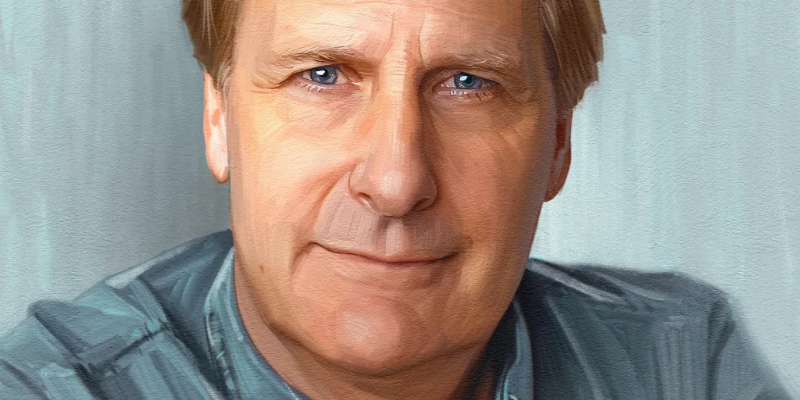
Jeff Daniels on Getting Inside a Story
This Week on the Talk Easy Podcast with Sam Fragoso
Illustration by Krishna Bala Shenoi.
Talk Easy with Sam Fragoso is a weekly series of intimate conversations with artists, authors, and politicians. It’s a podcast where people sound like people. New episodes air every Sunday, distributed by Pushkin Industries.
*
Actor Jeff Daniels is always writing. Plays, songs, a script or two. Even in interviews you get the sense the Michigan native is trying to relay the stories of his life in a way he’d find compelling as a reader, or listener. Bystander — as a viewer.
He joins us this week around the latest chapter of his crime series American Rust, reprising his role as Police Chief Del Harris. It’s a performance inspired by his midwestern upbringing in Chelsea, Michigan and the formative teachings of theater director Marshall W. Mason. Then, Daniels reflects on his arrival to New York City in 1976, performing in Lanford Wilson’s play Fifth of July, and his early on-screen roles in Jonathan Demme’s Something Wild, Woody Allen’s The Purple Rose of Cairo, and Noah Baumbach’s The Squid and the Whale.
On the back-half, we walk through his years making The Newsroom, working with screenwriter (and then playwright) Aaron Sorkin, and how the two of them reimagined Atticus Finch and To Kill a Mockingbird for both Broadway and what he calls “a country at a crossroads.” To close, we sit with the utility of good writing in this fraught era, and a musical tribute to his late father, Robert.
Subscribe and download the episode, wherever you get your podcasts!
From the episode:
Jeff Daniels: I need to be able to think like the character… in here, the part that you don’t hear. If I can think like the character, then everything else will kind of fall into place if you’ve done the prep work. At the end of the day, you want to be able to think like Atticus Finch or think like Harry Dunne. You want to be able to get inside like that, so then you’re just riding impulses, you’re just riding instincts. When you get that key into whatever the character is, then it’s jump off the clip and go. With Bernard in The Squid and the Whale, it was like, “We’re going to go dark? Let’s go dark.” But that led to God of Carnage, and that led to The Newsroom. And I remember doing God of Carnage on Broadway with Jim Gandolfini, and the movies were drying up, and I wasn’t getting anything that I wanted to do. I said, “Jim, I’m thinking about television,” and he goes, “Get yourself a good writer. I’ve got David Chase.” And luckily for me, Aaron Sorkin wanted me. When you’ve got the writing, as Woody said, you can write it. They’ll challenge you, too. A good writer will challenge you. From 2009 on, I’ve been fortunate to have good writing come my way, and that’s kept me not only in the business— but interested in the business.
Sam Fragoso: When it came to The Newsroom, Aaron Sorkin was looking for an actor that could express that rage, that could tap into an anger. He did not think that you entirely had that at first, is that right?
JD: Yeah, there was nothing really in film or TV that showed what he needed. That kind of knee-jerk rant that McAvoy needed to go on. Aaron needed to be able to see that before he cast me. I got a tip, a heads up that that’s what he needed to see. We were sitting at a breakfast table at the Four Seasons in New York—I was meeting Aaron and Scott Rudin for the first time—and I told a story about where I had lost it. And then I bang the table, and the orange juice glasses rattled and jumped, and coffee, and people at the other tables were turning around looking, and Aaron’s going, “ok, ok ok… good, good.” I was halfway through the story, and I was going to finish it because I wanted this part.
SF: So, you strong-armed him into giving you the role?
JD: I auditioned! I had to show that I could get there, and it might be uncomfortable and embarrassing. That’s all I knew. I didn’t know anything else except it’s a show about a newsroom. So it was like, if he needs to see this, here’s my best version of it. By the end of the breakfast, they said I got the part.
Talk Easy
Talk Easy with Sam Fragoso is a weekly series of intimate conversations with artists, authors, and politicians. It’s a podcast where people sound like people. New episodes air every Sunday, distributed by Pushkin Industries.



















